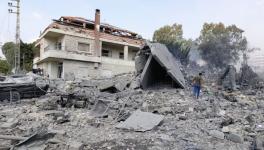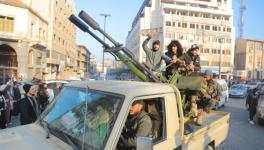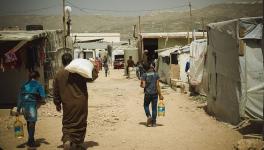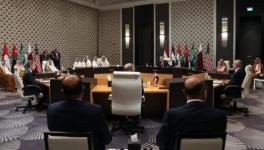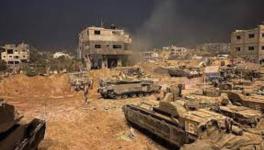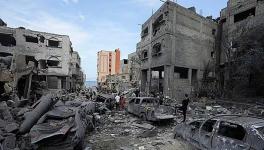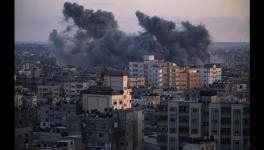Majority of Syrian Refugees are Living in Inhumane Conditions and Under the Threat of Violence
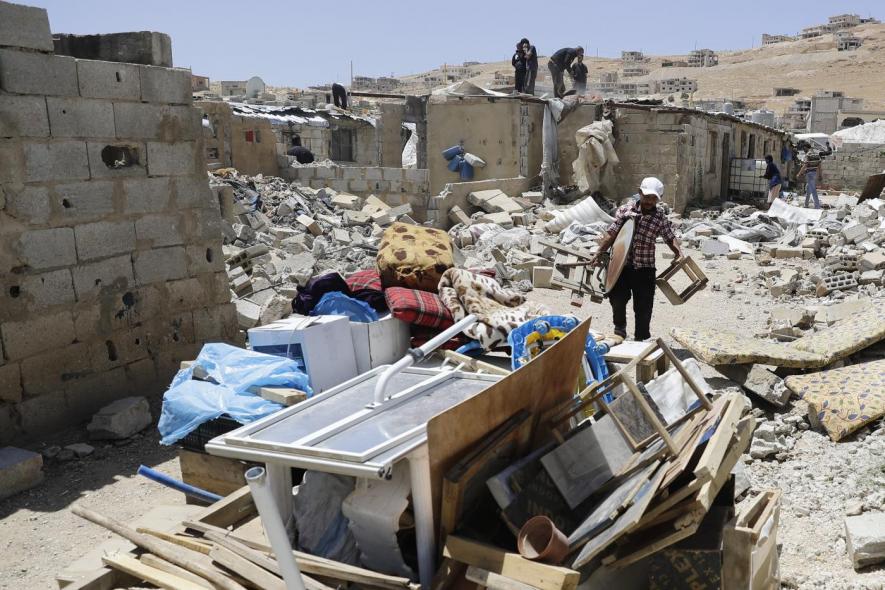
A Syrian man gathers his belongings as workers demolish cement block shelters at a refugee camp in the northeastern Lebanese town of Arsal, in the Bekaa valley (Photo: AFP)
According to the United Nations High Commission for Refugees (UNHCR) there are around 75 million people forced to be refugees around the world today. Around 41 million of them are internally displaced and around 20 million are refugees outside their countries of origin.
Most of these people are victims of violence largely caused by the wars waged by imperialist interventions. Among all the regions going through such wars the Middle East has the longest and bloodiest history of such interventions. There are three major ongoing wars in the region in Yemen, Iraq and Syria. These wars have caused the death of hundreds of thousands, destruction of properties and displacement of millions. The region alone has around 7.2 million refugees forced outside of their own countries. Out of these more than 6.7 million are from Syria alone. The nine-year long war in Syria has also displaced almost similar numbers internally.
Syria is already termed as “one of the worst humanitarian crises since the end of World War II”. Syrians are forced to live as refugees in different parts of the world today including Europe and North America. However, overwhelming majority is living in the neighboring Turkey (3.5 million), Lebanon (1.5 Million) and Jordan (0.6 million). More than half of these refugees are children below the age of 18.
Living Conditions
It is the poor who suffers the most in all such situations. They don’t only lose their meager belongings but also their jobs and means of survival.
The 1951 Geneva conventions as well as several national and international laws regulate the lives of refugees. A registered refugee has the right to health, education and work as per the Geneva convention. However, most of the states restrict such rights depriving these refugees’ opportunities of a dignified life. In some of the countries such as Turkey which is home to the largest number of Syrians fleeing their country, refugees are provided with the right to health and education but their right to work is restricted. If a refugee wants to work, he/she has to apply for a work permit which is not easily provided. Last year it provided work permits to only 40,000 Syrians.
All the Syrian refugees in Turkey are recognized as “guests” and not as refugees due to Turkey’s peculiar policy of only giving refugees status to persons from European countries. The 3.6 million refugees are provided shelter inside Turkey under Temporary Protection Regulation.
Since many Syrians are unable to obtain work permits, many are forced to work informally and are paid lower wages and subjected to several kinds of exploitation by the local employers.
In Lebanon, 70% Syrian refugees live below the poverty line. Their right to work is limited and they are often subject to different kinds of harassment. Recently the government decided to demolish all the pucca structures inside the refugee’s camps leaving a large number of them without a roof over their heads. Most other states also do not allow refugees to build decent homes. They are allowed to build temporary shelters with tin, plastic and clothes. In the sweltering heat during the summer when temperature sometimes rises to 40 degrees, these tin shelters become uninhabitable. The camps are mostly densely populated and unhygienic.
Schooling for children is a major concern for most of the refugees. Most of the camps do not have decent schools. Children are often forced to work in the absence of enough income to sustain the family. 3 out of 4 children working in Lebanon are Syrian.
Most of the time the refugees aren’t even allowed to raise their voice against the cramped, in-human conditions they live in. The UN and other donor agencies do provide some basic facilities and some economic aid to a large number of documented refugees. However, those who are not in the camps do not get such benefits. The Syrian refugees have been subject to forceful eviction, demolition of their houses, denial of job permits, violence.
Most of these Syrians had a much better living conditions before the war. Syria before the war was one of the countries in the region with good human development indicators and without deep inequality. Free health care, primary and secondary education and basic social security were services provided by the state. The war has destroyed that minimum security for most of the poor people.
A section of these refugees want to move to Europe to avoid their current condition. However, Europeans too are not willing to accept them. Hungary erected a wall to prevent Syrians moving to the country in 2015. Most of the other countries have imposed restrictions on the number of refugees that they can take already exhausting their fixed quotas. Due to the harsh restrictions, many refugees take the treacherous sea journey to Europe from North Africa in precarious conditions which has resulted in the death of thousands, as many European countries refuse to provide rescue ships. Last year, one out of every 50 people attempting to reach Europe by sea drowned in the Mediterranean. Many are also captured by coast guard and kept in detention centers. Last week more than 60 refugees and migrants in a Libyan detention center were killed in an airstrike.
Xenophobia
In January 2017, the Trump administration banned refugees from seven Muslim countries including Syria. Though this was initially stayed by the local courts, in June 2018 the US Supreme Court recognized the legality of the ban. Trump’s xenophobic and bigoted worldview is reflected in his anti-migrant policies. However, just like any other imperialist he conveniently forgot to acknowledge the role his own country had played in creating these refugees in the first place. Nonetheless, neither this amnesia nor the worldview is limited to Trump alone.
The refugees are facing hostilities throughout the globe. Rising ultra-nationalist tendencies, a common feature with most of the societies in the recent times, have experienced a boost due to the influx of refugees.
At a time when neoliberal economic policies are causing a growth in unemployment and unprecedented inequality, people are looking for easy explanations for their problems. A common complaint is refugees are “stealing” jobs, lowering the wages and overburdening state’s infrastructure. In Europe and to some extent in Turkey, Syrians are blamed for creating cultural problems. The xenophobic rhetoric adopted by some of the right-wing leaders in most of these countries creates problems of insecurity among these refugees.
According to a survey published by Ipsos Mori, a UK based market research company, in June this year says almost 60% of Turkish people are reportedly hostile to refugees.
In the first week of July, there were protests and riots against the Syrian refugees in Istanbul with people mobilizing on social media against the refugees. In the Istanbul local elections refugees have become a major issue with newly elected Mayor issuing statements hostile to Syrian refugees.
Lebanese foreign minister Gebran Bassil has been leading protests against locals hiring Syrian workers. His party Free Patriotic Movement is leading a campaign against the practice.
The people and groups opposed to such xenophobia have failed to influence the public opinion despite taking out demonstrations and other public actions.
Imperialist Wars
Syria was one of the few countries in the region with the longest period of stability. Except for a limited uprising of Muslims Brotherhood in 1982 which was brutally suppressed by Hafiz al-Assad, Syria had not seen any major conflict in its post-colonial history. Wars with Israel in the 1967 and 1973 created short term disruptions but the country moved back to normalcy in the aftermath. Many refugees from Palestine, the Lebanese civil war and the war in Iraq moved to Syria. The living standard and political freedom in the country was better than most of the other countries in the region.
The Syrian disaster is a classic case of an imperialist war waged by global and regional powers in the name of democracy and human rights. The legitimate aspirations of democracy are often exploited by anti-democratic forces backed by imperialist powers for their own vested interests. Instability or chaos in the Arab world is beneficial for the US, Israel and other external powers because it gives unrestricted maneuvering capability and control over the states. However, the common people have to face the consequences. The destruction caused by the current war in Syria (more than 60,000 dead and 12 million displaced with countless cities destroyed) can take years to reach the pre-war conditions.
Today, the war is almost over in most of Syria. A large number of refugees have begun returning to their homes from Jordan and Lebanon and it is expected that the numbers may increase soon. However the fear of fresh conflicts and the war erupting in Idlib is slowing this process down.
Get the latest reports & analysis with people's perspective on Protests, movements & deep analytical videos, discussions of the current affairs in your Telegram app. Subscribe to NewsClick's Telegram channel & get Real-Time updates on stories, as they get published on our website.









